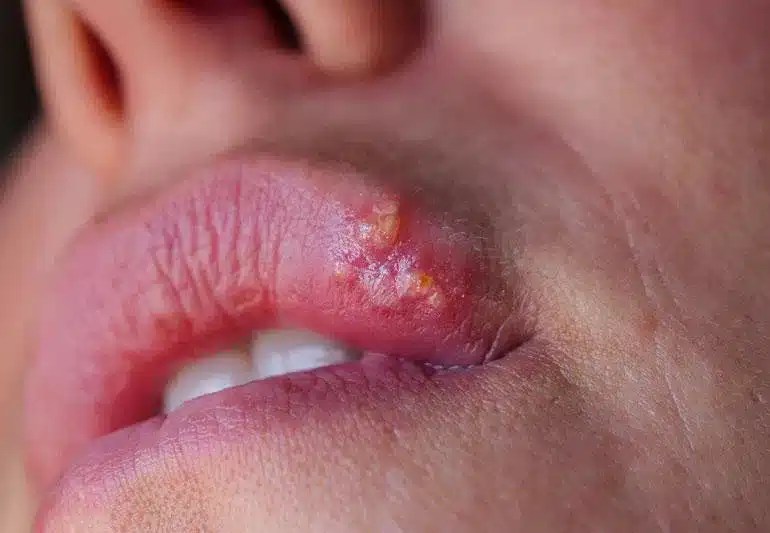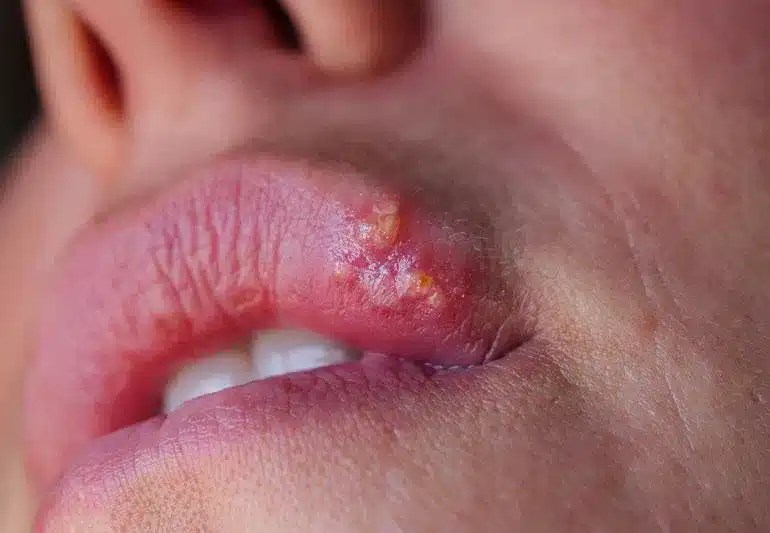🔍 If You Notice This on Your Lips, It Could Be a Cold Sore—Here’s What to Know

If you feel a strange tingling on your lips and then notice small blisters, you might be dealing with a cold sore.
These are often painful and can come back again and again. Cold sores are caused by a virus called herpes simplex type 1 (HSV-1).

While they’re not usually dangerous, they are very contagious and can make you feel uncomfortable. The virus stays in your body forever and can show up again when something triggers it.
🧬 What Causes Cold Sores?
The main cause is HSV-1, a virus many people get as kids—usually by kissing someone or sharing cups, forks, or lip balm. After the first time, the virus stays in your system but doesn’t always show signs. It hides in your nerves and can wake up again later.
HSV-1 is different from HSV-2, which is more common in genital herpes. But either type can spread to the mouth or genitals depending on how it’s passed from one person to another.
⚠️ What Can Trigger Cold Sores?
The virus can stay “asleep” in your body for a long time. But certain things can “wake it up” and cause a cold sore:
- Stress (emotional or physical)
- Having a cold, flu, or fever
- A weak immune system
- Hormone changes (like before your period)
- Sunburn or too much sun on your lips
- Feeling very tired or not getting enough sleep
The sores usually show up around your mouth, but can also appear on the nose, chin, or cheeks.
👄 What Are the First Signs?
Before you see a cold sore, you might feel:
- Tingling, itching, or burning on your lips
- Red or swollen skin in that spot
After a day or two:
- Blisters form, often in a group
- They fill with fluid, then pop and form a scab
- The sore usually heals in 2 to 4 weeks
If you start treatment early, it can help the sore go away faster and lower the chance of spreading it.
💊 How Can You Treat Cold Sores?
There’s no cure for HSV-1, but treatments can help you feel better:
Prescription medicines:
- AcyclovirorValacyclovir– best if taken when symptoms start
Over-the-counter (OTC) treatments:
- Docosanol cream– may shorten the outbreak
- Lidocaine or other numbing creams– help with pain
- Ibuprofen or acetaminophen– ease pain and swelling
🌿 Natural Remedies That May Help
Some natural options might help calm the sore:
- Aloe vera– soothes the skin
- Lemon balm– may help it heal faster and stop new outbreaks
- Tea tree oil– has virus-fighting properties (must be diluted)
- Petroleum jelly or lip balm– keeps the sore moist and protects it from cracking
🛡️ How to Prevent Cold Sores from Coming Back
You can’t get rid of the virus completely, but you can try to avoid outbreaks by:
- Lowering your stress
- Getting enough sleep
- Wearing lip balm with SPFin the sun
- Eating healthy, drinking water, and staying active
Keeping your immune system strong helps keep the virus in check.
🧼 How to Avoid Spreading the Virus
Cold sores spread easily—especially when you have a blister or scab. To protect others:
🚫 Don’t:
- Kiss anyone or get close during an outbreak
- Share lip balm, food, drinks, or towels
✅ Do:
- Wash your hands often
- Avoid touching your face, especially your eyes or mouth
🧑⚕️ When Should You See a Doctor?
Most cold sores heal on their own. But see a doctor if:
- You get them often(more than 6 times a year)
- The pain is very strongor the sore doesn’t heal
- The sore is close to your eyes
- You have a weak immune system
A doctor may suggest stronger medicine or test for other health issues.
🔬 What’s Being Done About Cold Sores?
Even though there’s no cure yet, scientists are researching new ways to fight HSV-1. They’re working on better treatments, vaccines, and even gene-editing tools that might help in the future.
✅ Final Thoughts
Cold sores are annoying, but they’re something you can manage. If you learn to spot the signs early, take care of your health, and follow smart habits, you can reduce how often they appear and stop them from spreading.
Be informed. Take action early. Protect yourself and others. 👄🛡️